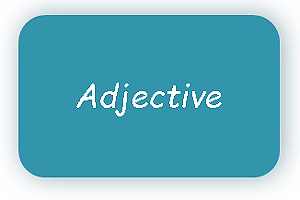Adjective definition for kids:
In Adjective meaning and examples, the adjective is a word that transforms the noun or pronoun in the sentence, it expresses an opinion, size, age, shape, color, etc.
adjectives are words that are will not represent nouns or pronouns. These words could also be covered in sentences in two ways. First, adjectives could also be placed before the noun that it describes, an individual can say “white ball,” “big house,” and “loud music.” On the opposite hand, an adjective can also be placed after the noun that it defines if a copula is employed in between them. For example: “The ball is white,” “The home is large,” and “The music is loud.”
Attributive and predicative adjectives:
Adjectives are practicing before a noun or pronoun they are attributive.
- she is a bad girl
- This is a huge building.
- The brown eyes.
Adjectives are practicing after a noun or pronoun they are predicative.
- This man is brave.
- The wall is green.
in above predicative “is” a linking verb.
some adjective functions as Noun.
Adjectives are utilized as nouns in a plural manner when they precede by “The“.
- The blind receive their sight.
- The homeless got their houses.
- The rich can buy anything they want.
Noun uses as Adjective
- He always wears cotton pant
- She likes the Golden chain.
Adjectives List:
- Rough
- sharp
- Hard
- Good
- Bad
- silly
- Brave
- High
- Clean
- Thick
- Little
- Handsome
- Heavy
- Intelligent
- Lovely
Examples of Adjectives:
- My friend is a very brave soldier.
- Be careful while cutting the Apples because the knife is very sharp.
- Today is very Lovely weather.
- The road is diverted to another side because heavy machinery is working there.
- Kindly pour the little Coffee into the cup.
- He drives the car very Rough.
- My younger brother is very intelligent in her class.
- My brother got a very attractive salary package.
- I am willing to visit adventurous places.
- beautiful scenery is my weakness.
- My mother always made Tasty food.
- Dubai is famous for its Huge buildings.
Degrees of adjectives (positive, comparative, Superlative)
Adjectives present the comparative and therefore the superlative degrees of comparison.
These forms are generally formed by tracking on the inflectional suffixes “-er” and “-est”, as explained within the following positive/comparative/superlative sets: fast/faster/fastest, much/more/most, strong/ strong/stronger/strongest. Note, though, that some adjectives form the comparative and therefore the superlative from two different roots, e.g. good/better/best, bad/worse/worst
Adjectives Positive degree:
It means one object or person and place without making a comparison.”Positive degree” may be a term that describes adjectives and adverbs. An adjective or adverb that doesn’t make a comparison is claimed to be of a positive degree. (In other words, the “positive degree” is that the normal sort of an adjective or adverb.)
Adjectives Comparative degree:
Comparative Adjectives are words that will not describe a noun by comparing it to a different noun. We usually recognize ‘er’ words like bigger or smaller, but they will be a touch trickier than that.
The way we form comparative adjectives is predicated on the number of syllables within the adjective and whether or not the adjective ends with the letter ‘y’.
Adjectives superlative degree:
Adjectives are words that describe nouns. It can give us knowledge such as the size or span of a noun. Adjectives describe an opinion about a noun or describe that how anyone is feeling. superlative use in adjectives to compare to more than two people, places, or things. Superlative adjectives mean that one noun is distinct from the other. For example,
“Huzaifa is the tallest boy” in the group.
“This painting is the most beautiful in all”.
“He is the happiest student in my class”.
Superlative adjectives set in English It depends on how several syllables the adjective has. For one-syllable adjectives, we add “the” and “-est” to the adjective.
| Positive ADJECTIVE | COMPARATIVE | SUPERLATIVE |
| Big | Bigger | Biggest |
| Tall | Taller | Tallest |
| Small | Smaller | Smallest |
| Hot | Hotter | Hottest |
Gradable Adjectives:
Gradable adjectives are common adjectives that may have levels of difference in them. for example, the adjective ‘cold’ is gradable – you’ll be extremely cold, quite cold, and even not in the least cold.
By combining the adjective with adverbs like ‘extremely’, ‘quite’, and ‘not at all you’ll show the degree of the adjective getting used.
- I am very happy to see you
- The dog was completely dead when the vet arrived.
- To make coffee, the water should be very boiling.
- Are you sure? / Yes, I’m quite certain.
- It’s really cold outside. In fact, it’s nearly freezing
Non-Gradable Adjectives:
This adjective means “Very” plus Adjective, which describes qualities that are completely present or completely absent. They do not occur in comparative and superlative forms, and also not use with adverbs such as very or extremely because we do not usually imagine degrees of more or less of the quality being described, They are referred to as non-gradable adjectives
Non-Gradeable Adjective examples:
Adjective Means
Ancient Very Old
Amazing very surprising
Delicious Very tasty
Delighted Very happy
Filthy Very dirty
Freezing very Cold
Brilliant Very intelligent
Furious Very Angry
Boiling Very hot
Gorgeous Very beautiful

